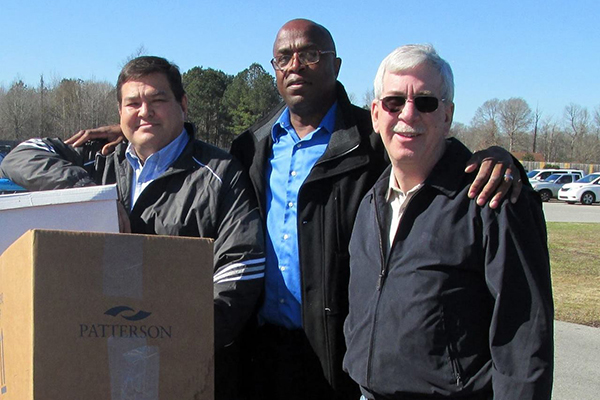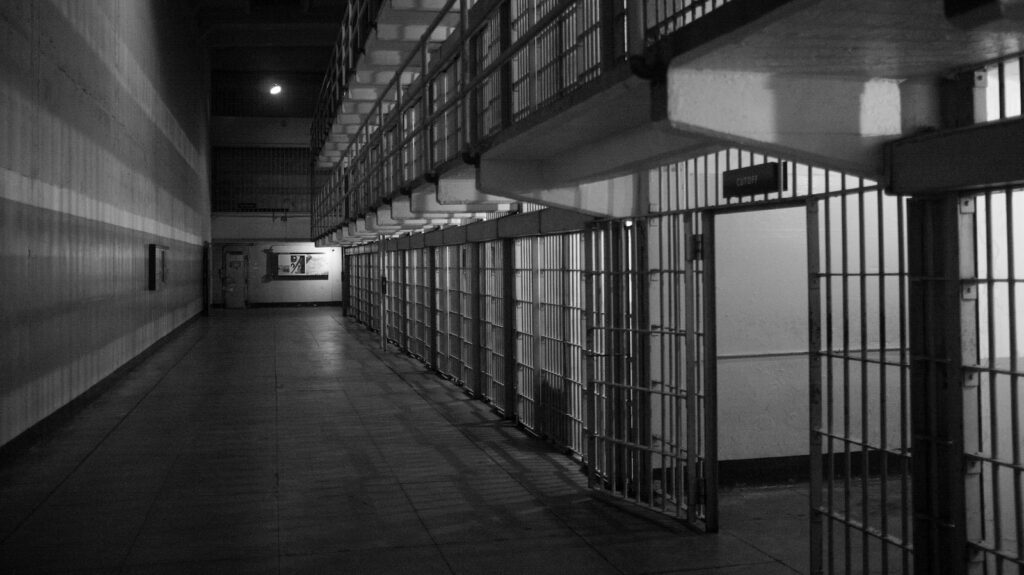‘First Step’ federal criminal justice reform a move for society’s common good
Criminal justice reform backed by both conservatives and liberals in the U.S. Congress has become a reality in federal law.
The First Step Act to promote the rehabilitation and societal re-entry of prisoners while maintaining public safety was signed by President Donald Trump on Dec. 21. The measure provides training for inmates and reforms some sentencing requirements, including certain drug offenses.
Trump’s action followed the House of Representatives’ passage of the bill Dec. 20 in a 358–36 roll call. The Senate approved the legislation Dec. 18 with an 87–12 vote.
The new law, which applies only to federal prisons, is an initial effort in what reform advocates hope will be an overhaul of the justice system in what has been described as the world’s most incarcerated country.
Faith community support
The bill — which models state reforms — seeks to correct disproportionate sentencing while establishing risk-assessment programs for prisoners and enabling low- and minimum-risk inmates to earn time credits so they can potentially serve 12 months or less of their sentences in pre-release custody.
Prison Fellowship — the ministry started by the late Charles Colson — helped lead the effort to enact the First Step Act, which clarifies that faith-based organizations may provide training in prison.
“This legislation will increase the access of faith-based and nonprofit organizations, like Prison Fellowship, to provide desperately needed programming in the federal prison system and help reduce recidivism,” Prison Fellowship President James Ackerman said in a written statement. “From our work in many states across the country, we can say without hesitation that these programs restore lives … and eventually reduce crime.”
The Southern Baptist Ethics & Religious Liberty Commission (ERLC) — which made criminal justice reform one of its legislative priorities in 2018 — also was part of the diverse body of First Step Act supporters that included liberals and conservatives both inside and outside Congress. The endorsing organizations extended from the American Civil Liberties Union and Center for American Progress on the left to a host of conservative groups, including the ERLC, Prison Fellowship and other evangelical entities, as well as Koch Industries, Heritage Action, The American Conservative Union and FreedomWorks.
ERLC President Russell Moore described the success of the First Step Act as a “tremendous victory” for criminal justice reform and cooperation across dividing lines for the common good.
“I can’t find very many people who would argue that our criminal justice system is working fine as it is,” Moore said in written comments. “Over the past several years many of us, across the ideological spectrum, have realized that we share, on this, some common concerns.
“Monumental challenges remain on seeing to it that our country deals with ensuring justice for victims while at the same time giving offenders, where possible, the opportunity for a second chance to reform and to contribute to society,” Moore said. “May we see forward momentum toward a justice system that is truer to its name.”
Rep. Doug Collins (R-Georgia) — a Southern Baptist who introduced the justice reform bill in the House with Rep. Hakeem Jeffries (D-New York) — said the First Step Act “shows us that reverence for human life is fundamental to justice.”
“The First Step Act invests in what Americans value most fiercely — people,” Collins said in a written statement. “We know that lives can be redirected and redeemed, and we’re committing to doing that with tools that are proven to work.”
Collins, who holds a master’s degree from New Orleans Baptist Theological Seminary, served as a pastor for 11 years in Gainesville, Georgia, before his election to Congress. He is a member of Lakewood Baptist Church, Gainesville.
Dangerous offenders exempt
Some Republican senators and outside organizations expressed concerns the First Step Act would threaten public safety by weakening mandatory minimum sentencing and not preventing some dangerous inmates from release back into society.
The final Senate version sought to address at least some concerns by, among other provisions, barring firearm offenders and fentanyl traffickers from earning time credits.
The bill also disqualifies from earned time credits offenses such as smuggling foreigners into the country for prostitution, assaulting a law enforcement officer with a deadly weapon, failure to register as a sex offender and trafficking in heroin or methamphetamine.
Need for change
Statistics demonstrate the need for change in the justice system, reform advocates contend. According to Prison Fellowship:
- About 65 million Americans, or one-fourth of the adult population, have a criminal record.
- 2.2 million men and women are incarcerated in the United States.
- Nearly 700,000 prisoners return to their communities each year.
- Two-thirds of prisoners who are released are arrested again.
- 2.7 million children have a parent in prison. (BP)
_____________________________________________________________________________
Expanded employment options part of latest state reform efforts
By Martha Simmons
Correspondent, The Alabama Baptist
Alabama’s state prison system has for decades needed fixing. Recent reform efforts are gaining traction and making headway, said Alabama Sen. Cam Ward (R-District 14).
State prisons have substantially reduced their populations in the past five years.
“At the same time there has not been an increase in the overall crime rate,” Ward noted.
As chairman of the Senate Judiciary Committee and the state Prison Reform Task Force, Ward is at the forefront of prison reform efforts in Alabama.
In 2014 he testified about the challenges faced by Alabama’s “failed corrections system” at a congressional prison reform meeting of the House Judiciary Committee.
Breaking the cycle
Criminal justice reforms enacted in Alabama in 2013 and 2015 reduced sentences for many nonviolent offenders, Ward said.
“There are certain violent offenders you want to keep locked away and keep society safe from,” he said. “But for those nonviolent offenders we’ve got programs to help them get out of the cycle they’re in.”
Propelled by court orders and lawsuits Alabama prisons struggle to provide the training and services needed to improve inmates’ ability to become productive citizens once they re-enter society.
Some 14,200 inmates were released from Alabama prisons in the 2017 fiscal year. Often they leave life behind bars only to find themselves shackled by unemployment.
It’s not unusual for ex-offenders — and their families — to wind up homeless. It’s a recipe for recidivism, with about 31 percent of inmates eventually reoffending and returning to prison.
Ward’s latest reform effort is aimed at giving former inmates more opportunities to get a job once they leave prison. He is sponsoring a bill that would allow inmates to apply for hundreds of jobs, licenses and certifications currently prohibited under Alabama law.
Currently, there are 783 sections of the Code of Alabama barring formerly incarcerated people from all manner of professions and jobs, including some that inmates trained for while they were in prison.
“Here’s a typical, ridiculous example,” Ward said. “Someone who served their time for a simple drug possession and did everything they were supposed to do can’t get a license to be an interior designer or a cosmetologist. We’re telling people we expect them to do right, yet we put all those barriers in place. What we’re really doing is setting them up to fail.”
If the bill is passed a former state inmate would be able to submit an application to a judge who would decide whether the individual should be granted a waiver and allowed to apply for certain jobs, licenses or certifications currently prohibited to ex-offenders.
Ward said this proposed legislation is the result of many meetings with judges, prosecutors and other criminal justice and community leaders.
Faith leaders have been particularly receptive to the plan, said Ward, who spoke to a group of Baptist pastors last summer and found them to be supportive of such reforms.
Power of forgiveness
“We should care about our fellow man,” Ward said. “The Bible doesn’t teach us to love just those who have done good. We should want people to be successful and lead a good, happy life.
“It’s about the power of forgiveness and what we’re going to do to help them.”
_________________________________________________________________________
Donations, time help inmates see a future after prison
By Michael J. Brooks
Correspondent, The Alabama Baptist
Tuscaloosa resident Eddie Smith, now retired, remembers with gratitude his 10 years as chaplain at the Bibb County Correctional Facility (BCCF) in Brent.
“I had been in corrections for a number of years when I became the first chaplain in the new prison,” he said. “The facility opened in 1997 and I began working there in 1998. We built the whole ministry program from the ground up.”
Smith said the original chapel facility was small and he began raising money for a new worship center. The current facility was dedicated after his retirement.
Smith said a unique program he began was the hygiene ministry.
“We had inmates with no income from outside sources, so we began to stock basic personal care items like bar soap, toothpaste, toothbrushes and stick deodorant,” he said. “We’d do a financial check to be sure there was a need, of course, and we solicited donations from interested people to help us get these items.”
Chapel library
Smith said he also had the idea for the chapel library.
“Inmates have a lot of time so I began to think about a ministry of Christian books and reference materials for them,” he said. “One day a businessman came with his church to volunteer, and he got interested in my idea. He built shelves for us to get started. Another man, a retired Methodist pastor, asked me to come and take his entire library, so this helped us get started in a major way. When I left, we had about 9,000 volumes.”
Current Bibb assistant chaplain Kervin Jones of Greensboro said the prison has continued both ministries.
“One large church brought hygiene packages for all our inmates, and this was great,” Jones said. “But most of the time we never have enough items for the needy. When the shelves go empty we begin to publicize the need.”
BCCF was built for 900 inmates and now houses about 1,800.
Siluria Baptist Church, Alabaster, donated its church library to the prison about three years ago. The church also collects hygiene items each February.
When employees of the Alabama Baptist State Board of Missions moved from downtown Montgomery to Prattville in 2018 many had extra books to store or give away. State missionary Keith Hinson learned of the need at Bibb and drove a van filled with books to Brent.
Chaplain Bysheen Tomlin has been at BCCF for two years. He said the prison is always looking for ministry volunteers.
“The Birmingham Theological Seminary has been with us for some time, and we have men enrolled in this program earning seminary degrees,” Tomlin said. “They’ll become ministers here at Bibb or in other state prisons.”
Tomlin said when volunteers invest their time, it reduces crime and violence.
“This investment also empowers our men to go forward with new skills and new encouragement,” he said.
The holidays are especially hard at the prison, Tomlin said, and the institution was on suicide watch during Christmas.
“Many inmates have no family or friends who care about them, and they struggle with depression,” he said. “Knowing someone cares is important.”
Tomlin said volunteers can help in numerous ways other than collecting hygiene items and books.
“Whatever life skills a volunteer has can be helpful,” he said. “It might be resumé-writing, financial planning, help for parenting or blended families or music and arts. Our men are eager to learn.”
Tomlin said he dreams of having congregations sponsor each of the 18 living areas at the prison.
“This means they’d have a relationship with 100 men,” he said. “This ministry would be reclaiming and redirecting men who’ve stumbled along the way.”
For more information about needs at BCCF, contact Bysheen Tomlin at 205-926-5252.






Share with others: